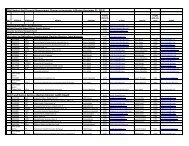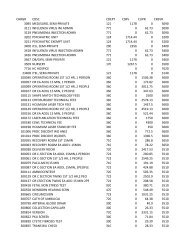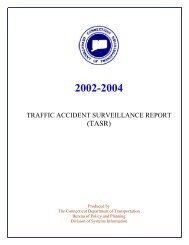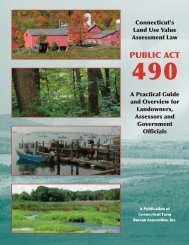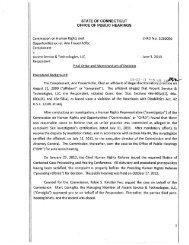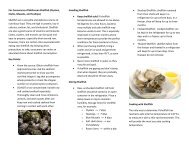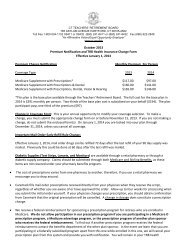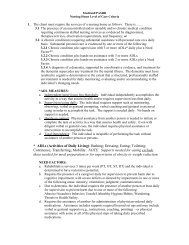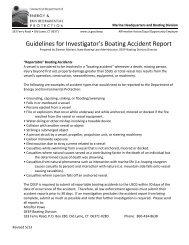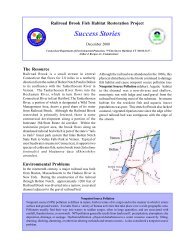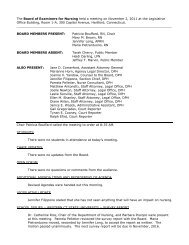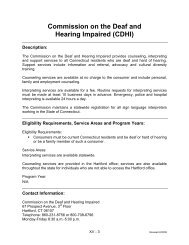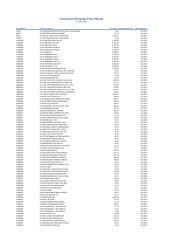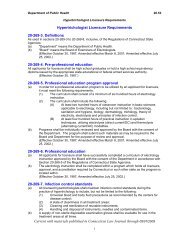2013 CT Anglers Guide - CT.gov
2013 CT Anglers Guide - CT.gov
2013 CT Anglers Guide - CT.gov
You also want an ePaper? Increase the reach of your titles
YUMPU automatically turns print PDFs into web optimized ePapers that Google loves.
Environmental Conservation Police<br />
DEEP’s Environmental<br />
Conservation Police<br />
Greetings,<br />
As we look forward to the beginning of another fishing season, the<br />
Environmental Conservation Police would like to remind everyone<br />
of the value and importance of practicing good ethics and being<br />
respectful of the environment while enjoying the outdoors. Recreating<br />
on the water, whether it is fishing or boating, is a privilege and we<br />
must protect it.<br />
Please keep in mind that some of our<br />
public access areas are adjacent to<br />
private property. When utilizing these<br />
areas, please be considerate of the private<br />
landowners who, in some areas, may be<br />
allowing us a right of way through their<br />
property. I encourage each one of you to<br />
express your thanks to them if possible<br />
which helps our Agency continue such<br />
Officer Keith Williams<br />
patrolling for illegal<br />
jet-ski activity.<br />
beneficial partnerships. Be respectful of all private property when<br />
recreating, whether it’s fishing from a boat or wading from the<br />
shoreline. Remember, do not cast into a designated swimming area.<br />
This not only creates conflicts with landowners but it is also illegal.<br />
When out fishing and boating, sportsmen should set the example<br />
by never leaving anything behind. Whether it’s the packaging of a<br />
new lure, fishing line, bait containers or food wrappers, all trash<br />
should be taken away to ensure the area is left in its natural state.<br />
Wildlife can be injured by trash that is left behind or dumped into<br />
the water. By practicing ethical behavior you are not only showing<br />
that you care for the environment but are also setting an example<br />
for future generations. Getting out for a day on the water can be a<br />
pleasurable experience for everyone and it all starts with you doing<br />
your small part to keep it clean and safe. Remember, please wear<br />
your life jacket when boating! I also encourage you to be vigilant<br />
and report suspected poaching activity or illegal behavior to our<br />
toll free call hotline at 1-800 842-4357. Thank you and have an<br />
enjoyable and successful fishing season!<br />
Thank you and good luck!<br />
Colonel Kyle Overturf<br />
Director-State Environmental Conservation Police<br />
Bureau of Outdoor Recreation<br />
Fishing Violations and Fines<br />
• Fishing without a license: $87.00<br />
• Violation of sport fishing regulations (includes closed season, bag<br />
and size limits, methods of take and specific area restrictions:<br />
$154.00 per count<br />
• Destruction of posted notice: $87.00<br />
• Failure to carry fishing license while fishing: $87.00<br />
• Violation of salmon fishing regulations: $87.00<br />
• Fishing while license or privilege suspended: $150.00<br />
• Illegal fishing for or taking of fish or bait in the Inland District:<br />
$154.00 per count<br />
• Unauthorized fishing in reservoir: $250.00<br />
• Unauthorized obstruction of streams or ponds: $250.00<br />
• Illegal fishing near fishways: $250.00<br />
• Operation of a motorboat on Bantam River: $50.00<br />
• Transporting vessel or trailer without properly inspecting for,<br />
removing and disposing of vegetation. $95.00<br />
The list above is only a partial listing of violations and their fines. These<br />
and other fisheries violations will be accompanied by a suspension<br />
of your hunting, fishing and trapping license(s). Help protect our<br />
natural resources for future outdoor sports enthusiasts, obey the<br />
law and report suspected violations by calling 1-800-842-HELP.<br />
Be a responsible angler<br />
Protecting both the resource and your access to the resource<br />
requires more than simply knowing and following the fishing<br />
regulations!<br />
Respect private property<br />
• Do not cast onto docks or into permitted swim areas (when<br />
in doubt, cast elsewhere).<br />
• Ask permission before fishing from shore, or wading on private<br />
property.<br />
Don’t litter, don’t pollute<br />
• Keep your boat and motor properly maintained.<br />
• Retrieve all lures and gear.<br />
• Don’t release live bait.<br />
• Leave your fishing area cleaner than you found it!<br />
Be a safe boater<br />
• Obey boating regulations, and check your safety gear<br />
frequently!<br />
Be a good neighbor<br />
• Treat fellow anglers, other recreational users and property<br />
owners with courtesy.<br />
• Always be willing to share both the resource and your<br />
knowledge.<br />
And always use common sense and be courteous!<br />
don’t let this happen again!<br />
Don’t litter<br />
Dispose of<br />
fishing line,<br />
lures, hooks<br />
and all other<br />
trash items<br />
properly.<br />
Dead osprey found hanging from its nest in Old Lyme, <strong>CT</strong>. Discarded<br />
fishing line, which is often picked up by ospreys to place in their<br />
nests, was wrapped around the bird’s neck.<br />
Photo courtesy of long-time DEEP Wildlife Division volunteer Hank Golet, who took the image prior<br />
to removing the dead bird.<br />
14 <strong>2013</strong> Connecticut Angler’s <strong>Guide</strong>



